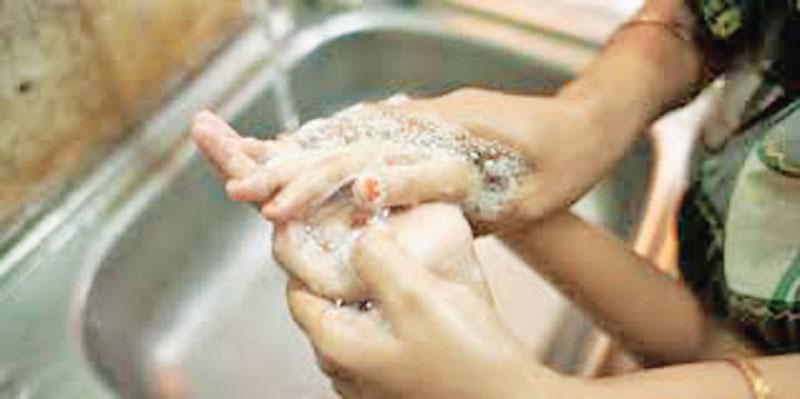
With thundershowers, heavy rains and floods reported islandwide health officials have expressed concern about an imminent outbreak of waterborne diseases- unless those at risk take proper precautions to prevent them.
Consultant Epidemiologist, Ministry of Health, Dr Thilanga Ruwanpathirana tells the Sunday Observer how they can do so at no cost while assuring that several interventions have already been put in place to avert an outbreak .
Excerpts…
Q. The country is now experiencing a critical flooding situation following the rainy weather. Consequently, there is a likelihood of numerous waterborne diseases to surface from contaminants in the water. What are these contaminants?
A. The contaminant could be categorized as bacteria (eg. Salmonella, Cholera), virus (eg. Hepatitis A), protozoa (eg. Amoebiasis ) and parasites (eg. Roundworm, Whip Worm)
Q.What are the common diseases in Sri Lanka during rainy weather?
A. We can categorize them as waterborne and vectorborne. Hepatitis A, Dysentery, Typhoid Fever are examples of waterborne while Leptospirosis, Dengue and Malaria are examples of vectorborne which are seen high in number during the rainy season.
Q. Which of them are considered as most serious?
A. All of them could be serious if not diagnosed and treated early. Because most of the waterborne diseases are associated with diarrhoea with or without passage of blood and mucous and which in turn could lead to dehydration, which is a killer.
Q. Are they infectious?
A. Yes, they are infectious. These diseases are spread by ingestion of food and water which are contaminated with the stools of an infected person. We call it feco-oral transmission.
Q. How are they caused?
A. There are many methods how the stools of an infected person could reach a healthy person. Contamination of the environment as a result of open defecation, leakages or overflowing from the sewerage tanks/toilet pits can pollute drinking water sources (wells, rivers, lakes), and is a high possibility during rainy and flood situations.
Further, flies, rodents, cockroaches can bring the environmental contaminants to the foods/water which are consumed by humans. Poor personal hygiene including poor hand washing practices, unhygienic cooking practices (insufficient cleaning of green leafy vegetables), not covering the cooked food are also contributing factors. Above all, drinking un-boiled / un-chlorinated water could lead to ingestion of the contaminants.
 |
| Dr Thilanga Ruwanpathirana |
Q. What are the signs? How soon will the symptoms show if you have a waterborne disease? A study in the US has revealed that the most common symptoms of infection are stomach cramps, watery diarrhoea, vomiting, fever, and weight loss, which usually begin 7 days after infection and can last up to 2 weeks. Your comments?
A.Yes, general symptoms of food and waterborne diseases are those. However, the symptoms and the duration to show the symptoms from the time of ingestion of the suspected food (incubation period) varies according to the type of the organism.
Following are the symptoms and incubation periods of the commonly occurring food and waterborne diseases in Sri Lanka. Hepatitis A has an incubation period of 14-28 days and the symptoms include fever, dark urine, yellow colour discolouration of the body and poor appetite. Typhoid fever has an incubation period of 8-14 days and presents with fever, headache, and loss of appetite, diarrhoea or constipation. Diarrhoea with blood and or mucus, fever and vomiting are symptoms of Dysentery (incubation period 1-7 days).
Q. Are those with already weakened immune systems likely to develop more severe and even life-threatening illnesses?
A. Yes, those with a weakened immune system have a high chance of getting serious complications if not medically attended to early. Complications of Dysentery are Haemolytic Uraemic Syndrome / Toxic Megacolon and even death. Complications of Hepatitis A include liver failure, pancreatitis and even death. Those with a weakened immune system have a high chance of getting liver failure if not treated early. Complications of the untreated Typhoid fever include bleeding into the digestive system. Further, it could lead to splitting of the same system which could have devastating repercussions by spreading the disease to other organs.
Q. What are the adverse health impacts of being afflicted by them?
A. Most of the food and water-borne diseases can be cured without long term sequel if treated properly and timely. However, in Typhoid fever there is a carrier stage in less than 5% of the infected, where they don’t show the symptoms of an active illness but spreads the disease.
Q. Who are most at risk age-wise?
A. Generally children (5 years) and the elderly are at the highest risk, as they can go into dehydration quickly.
Q. How do you treat them?
A. Loose stools and vomiting occur in many food and water-borne diseases and could lead to dehydration. Therefore, early identification and treatment for dehydration is important, because this could be lifesaving.
A dehydrated person is generally irritable. However, when the condition worsens he/she could become lethargic or even unconscious. Eyes would be sunken in moderate to severe dehydration. The tongue may be dry in moderate dehydration and in the severe form it would be very dry and furred. A good way of gauging the level of dehydration is skin retraction. In a healthy person when a skin fold is lifted and released with the thumb and the index finger, it will immediately go back to its original position. But in a dehydrated person skin fold will remain for a while to get back to the normal position. However, this cannot be demonstrated in an elderly person as their skin is very thin. A dehydrated person usually breathes rapidly and the colour of the urine is darker than usual.
It is important to note that these elaborated signs and symptoms are seen in many other conditions including normal situations. Therefore, it is always good to interpret them considering the background as well, and demonstrating more than one sign/symptom would give more weight.
Once the diarrhoeal (or vomiting) episode starts, the rehydration process should be started simultaneously. It would help in mild and moderate dehydration and is not an option for the severe form which needs immediate hospitalization and commencement of saline through the veins.
Oral rehydration can be done in many ways. There are several home remedies in the Sri Lankan context. In addition, it is always advisable to start an oral rehydration solution (ORS) (eg. Jeewani).
Abstaining from taking meals during the diarrhoeal episode, a noticeable practice in the country is not advisable. One should take his / her normal diet despite poor appetite or nausea. Taking frequent small quantities would help to retain. If the symptoms get worse seek medical advice.
Q. What is the value of ORS?
A. It is a mixture of sugar and salt in specific proportions. This exact proportion helps to absorb water in the gut despite the diarrhoeal condition. Therefore, it is important to prepare it according to the product information. The amount of water to be added is mentioned in the sachet. More importantly nothing else (lime, salt, glucose, soda etc) should be added to the preparation which would distort the required proportions. Once prepared it can be kept for 24 hours. Some people have complained that ORS induces vomiting. Therefore, it is good to drink small sips frequently.
Q. How do you prevent diarrhoeal diseases during the rainy season?
A. Drinking boiled cool water and eating homemade properly cooked meals are probably the best methods to prevent diarrhoeal diseases.
Q. What is the value of hand washing?
A. This is a very important behavioural practice which prevents many diseases, including, diarrhoeal diseases. UNICEF has identified five critical times during the day when one should practise hand washing with soap and water in the correct method. They are, before eating, before preparation of food, after defecation, after cleaning child following defecation and before feeding a child.
Q.What are the other methods available for the prevention of diarrhoeal diseases during the rainy season?
A. There are many and can be categorized as improvement of sanitary facilities, adhering to stringent food safety practices and immunization.
Improvement of sanitary facilities include, motivating to use a toilet for defecation. According to the demographic and health survey (DHS) done in 2016, there are 1.5% to 2% of individuals who do not use toilets for defecation in Sri Lanka. Similarly, it is important to dispose of the faeces of small children in a toilet. Public water supplies need to be protected from faecal contamination.
Food safety practices include cleaning the green leaves/vegetables thoroughly before consuming, cooking for an adequate amount of time and keeping the cooked food and fresh cleaned fruit covered to avoid contamination by mechanical vectors like flies.
There are vaccines available for several food and water-borne diseases in Sri Lanka, eg. Hepatitis A and Typhoid Fever.
Q. Has there been any attempts to conduct a national survey on diarrhoeal diseases?
A. Yes, DHS which is done once in five years by the Census and Statistics Department which has details on diarrhoeal disease of children under 5 years. In their 2016 report, approximately 3% of the under five children had diarrhoeal disease two weeks before the survey date as reported by their mothers.
Q.Your message to the public and some useful and practical ways to perform the tips on preventing waterborne diseases?
A. Wash hands with soap and water, drink boiled cool water and eat homemade food as much as possible to help you to prevent the diarrhoeal diseases during these rainy days.
